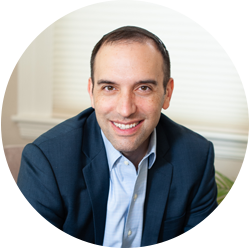
Shalom Chaverim,
Earlier this week, CJP hosted a Jewish Federations of North America Senior Advisory Council meeting with professionals from across the country who work with endowments, planned giving, and donor advised funds. It was the largest gathering to date of this group, who spent two days together learning about trends, public policy, and best practices. Having already been inspired by my colleagues’ great work in this space, it was a pleasure to see them engaged with and leading the way for their peers around the country.
I joined the group for an evening program that featured two of CJP’s — and Greater Boston’s — passionately committed philanthropists and volunteer leaders. They shared their personal journeys and perspectives on what it means to give through a Jewish lens, both inside and outside the Jewish community.
One moment during the program stood out for me. In response to a question about how each came to be so involved as a donor and volunteer, the first panelist answered: “This has been in my blood since I was a child. My parents were ‘federation Jews’ who instilled in us and modeled for us what it means to be part of creating and sustaining our community.”
She continued, “As parents, it was clear to us that we wanted to pass on knowledge, culture, and pride to our children. We weren’t day school people growing up, but, to our surprise, we discovered Jewish day schools and realized that this would be a powerful way for us to transmit our Judaism to our children.”
Her answer was a beautiful illustration of the Jewish tradition’s message to parents: “V’shinantam l’vanecha — And you shall teach these words to your children.”
During CJP’s annual From Strength to Strength celebration, I described the rabbis’ transformational response to the destruction of the Temple in Jerusalem 2,000 years ago: They rebuilt the Jewish future by putting Judaism in the hands of parents, responsible for passing it on to their children in ways that would be relevant and meaningful to each generation.
The other philanthropist on the panel shared a different story of Jewish family and identity.
“We seem to have had somewhat opposite experiences,” he began, “because my Jewish journey happened in a totally unexpected way. I was proud to be Jewish but had a minimal education and was far more engaged with the broader world. Due to unexpected circumstances, though, we too ended up sending our children to Jewish day school, and that was our way in to Jewish life. While we knew that our kids would have a great experience, the shock was the impact the school had on us and our whole family... I’ll never forget when our kids came home and challenged us: ‘why haven’t we been to Israel!?’”
His children became his teachers.
These panelists' stories ring true for many in our community. While they chose day school, many new models of engaging the next generation in Jewish life — schools, camps, Israel programs, PJ Library, and more — inspire and educate our children in ways that we never experienced. What is amazing about this moment and this community is that there are so many opportunities to learn and so many ways in, at every stage of our life. The Jewish journey is anything but a linear one, and inspiration can come from anywhere at any time.
I love the juxtaposition of these two panelists’ stories because, together, they shine a new light on the well-known phrase “dor l’dor — from generation to generation.”
We can preserve the Jewish future through "traditional" transmission from parents to children; and, we can create the Jewish future by engaging in a dynamic, intergenerational, virtuous cycle of learning and growth.
We are all teachers and learners. This is an awesome opportunity and a huge responsibility.
Shabbat Shalom,
Rabbi Marc Baker
If you'd like to receive my biweekly messages by email, sign up here.

About the Author
CJP President and CEO Rabbi Marc Baker is an educator, writer, and leadership mentor who is devoting his life to Jewish learning and building Jewish communities.
